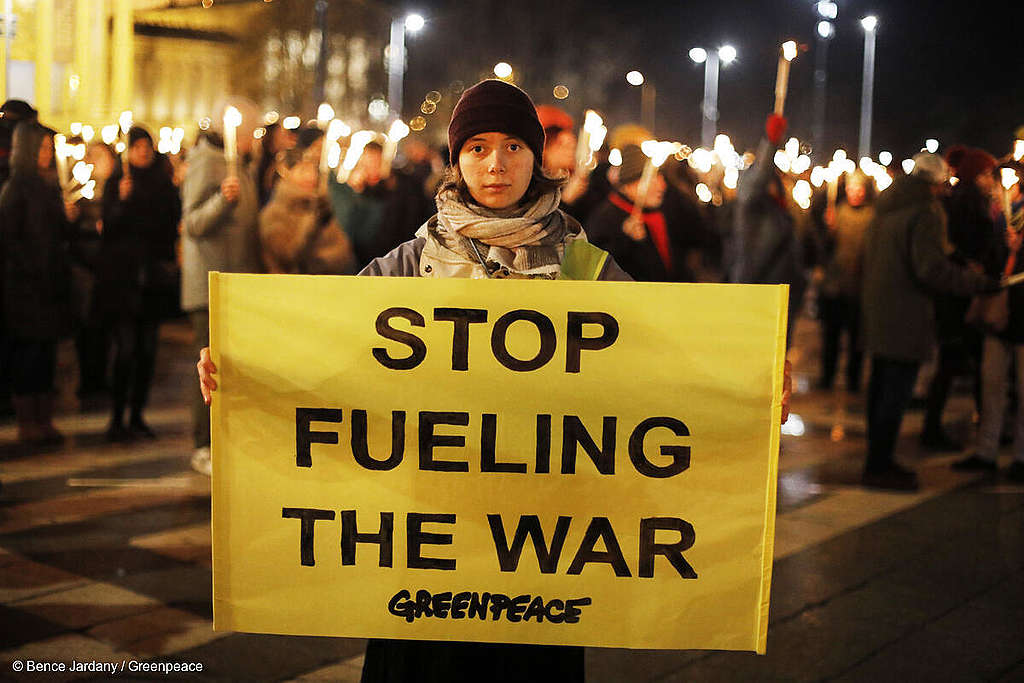Brussels – The European Commission’s plan to end the EU’s dependence on energy imports from Russia, REPowerEU, will continue to bankroll conflict, human rights abuses and environmental destruction, while leaving people in Europe with high energy bills, said Greenpeace.

The plan, released today, focuses on diversifying Europe’s imports of oil, gas and uranium from suppliers other than Russia, rather than ending Europe’s dependence on these fuels.
Greenpeace EU climate and energy campaigner Silvia Pastorelli said: “The EU has been burned by its reliance on dirty Russian fuels, but now the European Commission is just searching for new fires to stick its hands in. These plans will further line the pockets of energy giants like Saudi Aramco and Shell, who are making record profits on the back of the war, while people in Europe struggle to pay the bills. The Commission’s focus on swapping one source of dirty fuel with another keeps bankrolling environmental destruction and human rights abuses, and will lock in fossil gas for decades to come. A real plan to phase out fossil fuels, expanding energy savings and renewables, would end the EU’s dependence on imports, while bringing energy bills down for ordinary people, instead of padding corporate profits.”
Greenpeace EU analysis of the REPowerEU proposals:
Energy demand
The Commission plan for the most part avoids regulatory measures to reduce energy demand, proposing instead to encourage consumer behaviour changes, and suggesting that MEPs and national governments increase the EU’s energy efficiency target for 2030 from 9% to 13% (compared to 2020). The strategy also largely underestimates the role that demand reduction could play in the transport sector, which consumes about two thirds of the oil in the EU.
While the European Commission considered mid-term energy efficiency measures for cars and trucks, it overlooked the potential of energy savings from measures that would reduce road and air transport. Recent research found that the EU’s oil consumption could already be cut by 7% this year with the introduction of short-term measures in the transport sector, on the path to full decarbonisation of transport by 2040.
Fossil gas
The REPowerEU plan foresees an expansion of the global market for liquified fossil gas, with an eye on new suppliers from Qatar to Israel and Egypt. The European Commission secured a deal to import liquified gas from the US, whose plans for new fossil fuel extraction could alone push global temperatures over the 1.5-degree limit set in the Paris climate agreement. Recent research shows that if global temperature rises are to be limited to 1.5 degrees, and the worst effects of climate breakdown avoided, not only should no new fossil fuel projects be launched, but production from existing sources must also be shut down early.
The Commission’s REPowerEU strategy contains no deadlines or plans for phasing out fossil fuels or fossil fuel subsidies. Instead, domestically, the plan proposes to invest €10 billion in new gas infrastructure, like terminals, which could lock the EU into decades more of fossil gas dependence. A recent analysis shows that no new gas infrastructure is needed to phase out Russian fossil gas.
Hydrogen
The Commission also plans to kickstart a global market for renewable hydrogen. NGOs have warned that over-reliance on hydrogen will in fact lead to hydrogen produced by other more polluting sources, or will mean that renewable electricity will be wasted on hydrogen production when it’s better used for electrifying whatever the hydrogen will be burned to do. Imports of hydrogen from outside Europe could also come at the expense of people in those countries who need access to renewable energy themselves.
Renewables
The Commission’s plan also proposes to increase renewable energy, pushing MEPs and national governments to increase the EU’s renewable energy target for 2030 to 45%, still below the 50% target that would be compatible with the Paris climate agreement’s goal of limiting global heating to 1.5 degrees. However, the Commission has already come under fire from environmental groups for proposing to accelerate permitting procedures, in ways that could undermine nature protection. Moreover, the European Commission plans an increase of biomethane to 35 billion cubic metres by 2030, more than double the Commission’s proposed 17 billion cubic metre target from July 2021, and much higher than the volume of available resources that can be used in a sustainable way.
Contacts:
Silvia Pastorelli, Greenpeace EU climate and energy campaigner: +32 496 12 20 94, [email protected]
Greenpeace EU press desk: +32 (0)2 274 1911, [email protected]
This press comment is also available on: www.greenpeace.eu
For breaking news and comment on EU affairs: www.twitter.com/GreenpeaceEU
Greenpeace is an independent global campaigning network that acts to change attitudes and behaviour, to protect and conserve the environment and to promote peace. We do not accept donations from governments, the EU, businesses or political parties. Greenpeace has over three million supporters, and 26 independent national and regional organisations with offices in more than 55 countries.
EU Transparency Register: 9832909575-41
